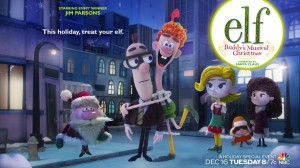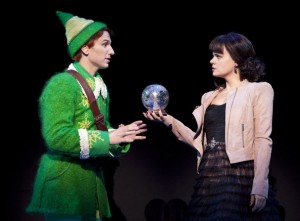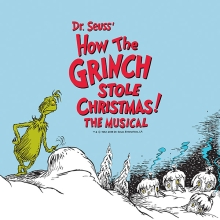Filichia Features: Elf on TV, Elf on Stage
Filichia Features: Elf on TV, Elf on Stage
"You saw some of it on TV. Now see all of it on stage."
That's one way you could advertise your production of Elf during the 2015 holiday season. After all, the recent animated NBC special -- although funny, charming and touching -- was a mere hour long and offered only a fraction of Thomas Meehan and Bob Martin’s witty book, Matthew Sklar's tuneful music and Chad Beguelin's sharp lyrics.
So let’s concentrate on the original musical, the full-length story of Buddy the Elf, the North Pole resident who’s learned that he’s really Buddy the human. As an infant resident of an orphanage, he’d snuck inside Santa’s bag. His mother had died without telling his father that he existed. Now Walter Hobbs’ son has come to New York City to find his daddy.
The TV special has the unlikely scenario of Buddy’s just happening to run into Walter in a city of eight million. The stage show instead offers a more convincing scene: Buddy simply goes up to Walter’s office -- a terrible time for Walter. He’s made a big mistake at work and now must make up for it. And wouldn’t you know his wife Emily and son Michael now show up and expect him to accompany them on a hunt for a Christmas tree. Walter sings (in a song not in the TV version) “Christmas Always Gets in the Way,” which includes one of Beguelin’s best lyrics: "Money doesn't grow on Christmas trees."
So when Walter meets the naturally affectionate elf who finds childish delight in everything, he judges him “insane” and “an idiot" –even before Buddy uses the shredder to make “snow” out of an important document. What we love about Buddy, however, is that he’s innocent of humanity’s worst qualities. In the numerous times he’s mocked or insulted by cynical Manhattanites, he doesn’t realize it because he’s never known regular people. They can best be described by a line in the film version of Harvey: "You know what stinkers they can be."
One of them is Jovie, who works in the Macy’s Christmas toy department. Unlike her TV counterpart, Jovie is far more complicated and dour n the stage show. "I'm not a Christmas person," she warns Buddy when she meets him, before narrowing her eyes to slits and warning "So dial down the elf-speak." Jovie offers many wisecracks to show she's wise enough to keep her tough facade from cracking. "If you lower your expectations in life," she advises Buddy, "you avoid a lot of disappointment."
But he does win her over, which leads to further complications. Jovie eventually sings one of those jazzy, razz-ma-tazzy woe-is-me songs in which she tells anyone who'll listen "Never Fall in Love with an Elf." Those who saw the show on TV will enjoy discovering it when they see the show on stage.
NBC's Buddy's Musical Christmas
Emily in the full-length musical is initially supportive of Buddy, although she eventually tells her son “You have a crazy brother. Lots of people do.” Michael stays loyal, because Buddy is more than the brother Michael never had; he's the father Michael needs. This subplot is downplayed in the TV version, which eliminates some decidedly adult references found in the stage show – such as two elves alluding to having had an affair and a theme of “Christmas is all about fighting with your family.”
The TV special had Emily accept at face value that Buddy was Walter’s son. On stage, Emily pulls out a hair from Buddy's head -- and because Walter always leaves hair in the sink, she’s able to provide enough evidence for DNA testing. Buddy's his son, all right. Such a complex concept wouldn’t have been right for an animated special – no more than the stage show’s jokes about the dangers of youth hostels, tattoos on buttocks, Charlie Sheen, Charlie Rose and even the strange smell our urine acquires after we eat asparagus.
Needless to say, the TV version didn’t need to tell viewers to shut off cell phones and unwrap candy. The stage play, like all others these days, does – but in a most clever way: Santa starts the musical by saying he’ll tell us a story, but not until he turns off his technological noise-making devices and deals with his noisy shrink-wrapped confections.
On TV, Santa’s sleigh was powered by reindeer. Well, of course, you say. But Elf on stage says that PETA -- People for the Ethical Treatment of Animals – stopped Santa from using reindeer. Here the power to get the sleigh comes from people believing in Santa. If they don’t, the sleigh stays earthbound. So getting Walter, Emily and Michael to believe in Santa impacts the plot.
The Broadway productions in both 2010 and 2012 had the money to raise one. And if you stage is strong enough and you have a forklift that can be obscured, go for it. Otherwise, you could have Santa’s sleigh fourth-wall and have the eyes of men, women and children raise skyward as their belief in him makes it take off.
But that brings up another point. Many a musical has carried with it a warning "Not suitable for children under five," as a red flag that some salacious material is included. Elf should offer the same disclaimer, despite its being innocent as a rose, for it contains a good deal of dialogue that reveals that adults and many children know there is no Santa Claus.
Elf on Broadway
What wasn’t in the TV version – and wouldn’t have been expected -- is a line that occurs during Buddy’s second visit to Walter’s office. He’s so exuberant to be there that he runs over to Jim, one of his father’s employees, hugs him tight and lifts him high off the ground.
Jim is literally but not figuratively swept off his feet. He staunchly says, “I already have a boyfriend!”
There would have been a time when such a line wouldn’t have been in a “family show.” Or if it had, Jim would have reacted in horror to Buddy’s affection, given him a startled look that said “You’re crazy!” or said something worse. The audience would have then laughed at the plight of a heterosexual man having to endure the affection of an ostensibly gay one.
If you don’t care for this line, remember that your contract specifies that you must honor every word in the script. As one of Beguelin’s lyrics goes (with an assist from William Shakespeare), "To thine own Elf be true."
And yet, the script contains no stage direction on how the line must be said. So if you fear that your audience won't be amused but offended, you could have the actor playing Jim say the line sarcastically.
That choice might not be necessary. In the four visits I’ve made to Elf, I’ve heard parents and their children enjoy the quip. I saw no father or mother wince, screech or put hands over any kid’s ears. Today’s young ‘uns are inured or even blasé about sexual orientation from having encountered Jack McFarland, Ellen Richmond and Karl Hummel.
So there’s the irony: TV introduced those characters to everyone, but the TV version of Elf didn’t use the line.
What both Elfs do is celebrate the Christmas spirit and have a workaholic as well as a dour young woman each find an inner child. So let’s call Elf the “Miracle On 34th Street of the 21st century,” for these same issues show up in that famous 1947 film and 1963 musical version. Miracle became a beloved perennial and Elf is on track to be one, too, be it on TV or in the stage versions that you and many other companies will produce.

You may e-mail Peter at pfilichia@aol.com. Check out his weekly column each Tuesday at www.masterworksbroadway.com and each Friday at www.kritzerland.com. His new book, Strippers, Showgirls, and Sharks – a Very Opinionated History of the Broadway Musicals That Did Not Win the Tony Award is now available at www.amazon.com.




























